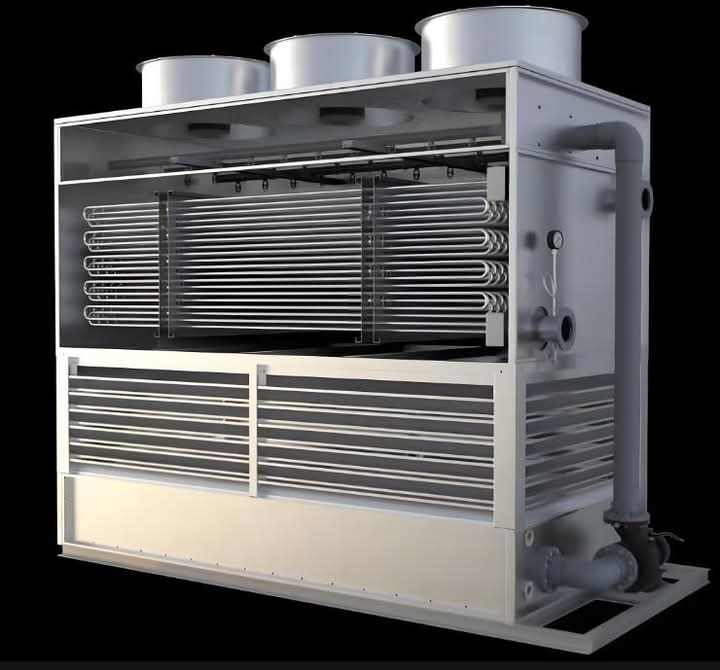Placing the heat exchanger coil inside a cooling tower (as seen in Closed Circuit Cooling Towers) offers several advantages over traditional open cooling towers or remote heat exchangers. Here are the key benefits:
- Space & Layout Efficiency
• Compact design: The coil (heat exchanger) is integrated into the tower, eliminating the need for a separate heat exchanger unit.
• Reduced piping: No external connections for cooling water, lowering installation costs and complexity. - Improved Energy Efficiency
• Direct cooling: The process fluid is cooled directly by evaporative heat transfer, improving thermal efficiency.
• Lower pump power: Since the cooling water loop is eliminated, energy consumption is reduced. - Reduced Water Consumption
• Closed-loop operation: The process fluid (e.g., chilled water, glycol mix) stays inside the coil, preventing evaporation loss.
• Minimal blowdown needed: Unlike open towers, there’s no need for frequent water drainage to control scaling. - Prevention of Contamination
• No exposure to outside air: The process fluid remains sealed, avoiding contamination from dirt, debris, or biological growth (e.g., Legionella).
• Ideal for sensitive applications: Used in pharmaceuticals, food processing, and HVAC systems where clean cooling is critical. - Lower Maintenance & Longer Lifespan
• Less scaling & corrosion: Since the process fluid is isolated, mineral deposits and corrosion are minimized.
• Reduced fouling risk: No algae or sludge build-up inside the coil compared to open systems. - Freeze Protection in Cold Climates
• Glycol compatibility: The closed loop can use antifreeze solutions (e.g., propylene glycol) without affecting the cooling tower’s operation.
• Dry operation possible: Some models allow dry cooling in winter, avoiding water use entirely. - Noise & Aesthetic Benefits
• Fewer mechanical components: No external pumps or heat exchangers mean quieter operation.
• Cleaner installation: No risk of water spillage or algae growth on external surfaces. - Common Applications:
- HVAC systems (chillers, heat pumps)
- Industrial processes (chemical plants, power generation)
Data centres (efficient, reliable cooling)
Medical & food industries (contamination-free cooling) - Comparison with Remote Heat Exchangers
